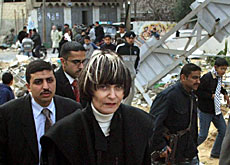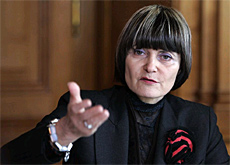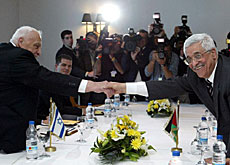Swiss diplomacy put to the test in Middle East

The visit by Foreign Minister Micheline Calmy-Rey to Israel and the Palestinian territories has brought Switzerland’s role in the region into focus.
Some analysts say Switzerland’s emphasis on humanitarian action has been further strengthened by the trip, while its political positions have provoked controversy.
Others doubt whether anything has really changed in the Middle East.
Israeli political scientist André Eschet Schwarz – who is originally from Switzerland – wants to believe it has. “The pullout from Gaza and the northern West Bank marks a radical change in the policy pursued by Israeli Prime Minister Ariel Sharon,” he told swissinfo.
“He is now moving in the direction of the [United States-backed] ‘road map’ and coming closer to the parameters of the Geneva Accord.”
The alternative peace initiative, which was launched in Geneva in 2003 with the support of Swiss diplomats, outlines a plan for the division of Jerusalem and the creation of a Palestinian state.
Eschet Schwarz, who teaches at Haifa University, does not agree with the view held by many Palestinians that the pullout from Gaza is the only territorial concession Israel intends to make.
“It is an illusion to think that the withdrawal from Gaza and the northern West Bank is the end. I think the international community will put pressure on Israel to continue the process.”
He sees another reason for hope: “A number of signatories of the Geneva Accord are members of Sharon’s new government, like the interior minister, Ofir Pines. And the views of the deputy prime minister, Shimon Peres, are very close to those outlined in the Geneva Accord.”
Experts’ meeting
There is some support then for Switzerland’s position. And Calmy-Rey’s offer to convene a meeting of experts to discuss the flow of goods into the Gaza Strip was also well received during her trip.
Researcher Riccardo Bocco of the Geneva-based Graduate Institute for Development Studies believes this is an issue which must be addressed.
“It is a question of the economic survival of the Gaza Strip,” he told swissinfo.
Under the terms of international humanitarian law, Israel will remain an occupying force in Gaza even after the pullout.
“We also have to consider issues such as sovereignty over Gaza’s airspace and coastline,” added Bocco, who is team leader at the Palestine Research Unit, which is affiliated to the Institute for Development Studies.
“Switzerland could make available a team of experts and lawyers to address these sensitive issues,” Bocco said. “Swiss diplomacy has a role to play here as intermediary and ‘facilitator’.”
Security barrier
Switzerland is also using its good offices in another difficult area. The United Nations General Assembly has asked it to consider the humanitarian and legal consequences of Israel’s security barrier and to conduct consultations on this issue.
“For Israelis, the security wall has greatly reduced the number of attacks. So it is considered a very important defence mechanism,” pointed out Eschet Schwarz.
But the Israeli professor adds that the wall and its impact on the daily lives of Palestinians is a hotly debated topic in Israel. “At the outset, the wall was quite far from the 1967 borders, but it has been drawing closer and closer to the [pre-1967] green line.”
Eschet Schwarz believes Switzerland could help to find a compromise solution acceptable to both sides.
But relations between Israel and Switzerland have become strained, as Sharon’s refusal to meet Calmy-Rey demonstrated.
Strained relations
“The two countries have a long history of friendship, but for some years now relations have been deteriorating,” Eschet Schwarz said.
“The rightwing and centrist Israeli parties consider the position of the Swiss Social Democrats [Calmy-Rey’s party, which has condemned the building of the wall] as an interference in Israeli domestic affairs.”
“And they think that Swiss neutrality does not sit very easily with Switzerland’s support for the Geneva Accord,” Schwarz added.
According to Riccardo Bocco, Switzerland’s position on the Israeli-Palestinian conflict is supported by parties other than the Social Democrats and was defended by previous Swiss foreign ministers.
There is one area of Swiss involvement which is not disputed, Eschet Schwarz points out. “Switzerland’s aid to the Palestinians is viewed positively by Israel.”
swissinfo, Frédéric Burnand in Geneva
Recent Swiss visits to Israel:
May 1998: Swiss President Flavio Cotti
May 2000: Interior Minister Ruth Dreifuss
March 2001: Foreign Minister Joseph Deiss

In compliance with the JTI standards
More: SWI swissinfo.ch certified by the Journalism Trust Initiative



You can find an overview of ongoing debates with our journalists here. Please join us!
If you want to start a conversation about a topic raised in this article or want to report factual errors, email us at english@swissinfo.ch.